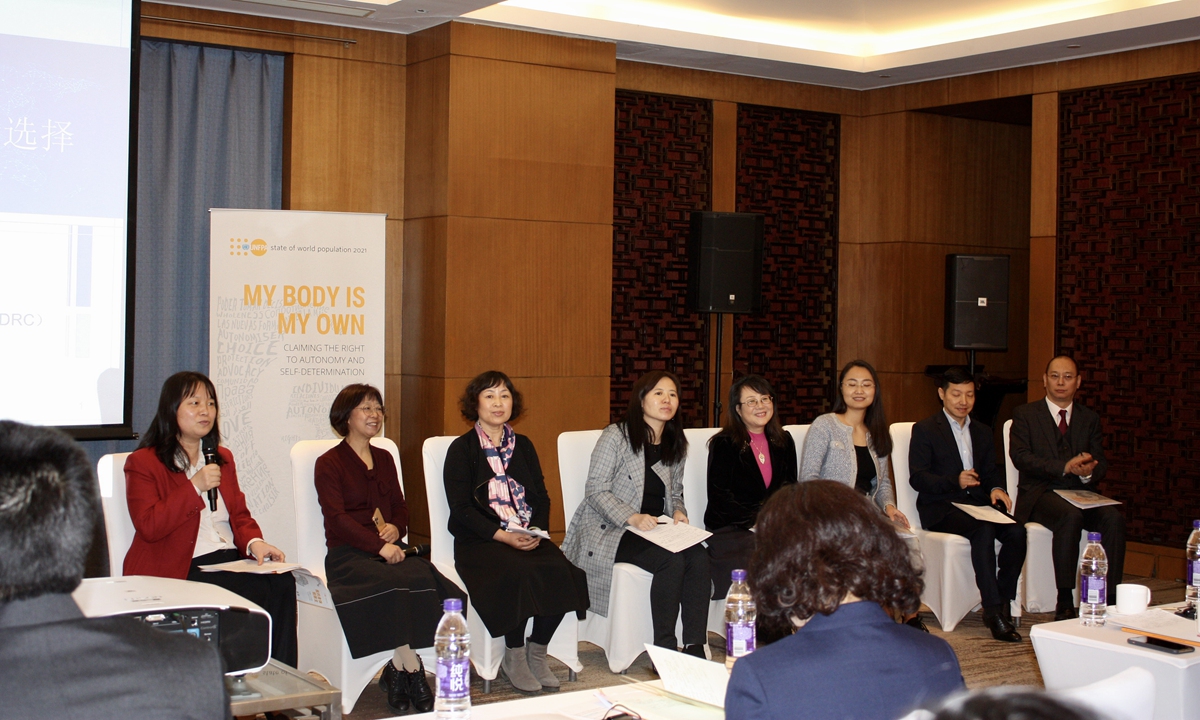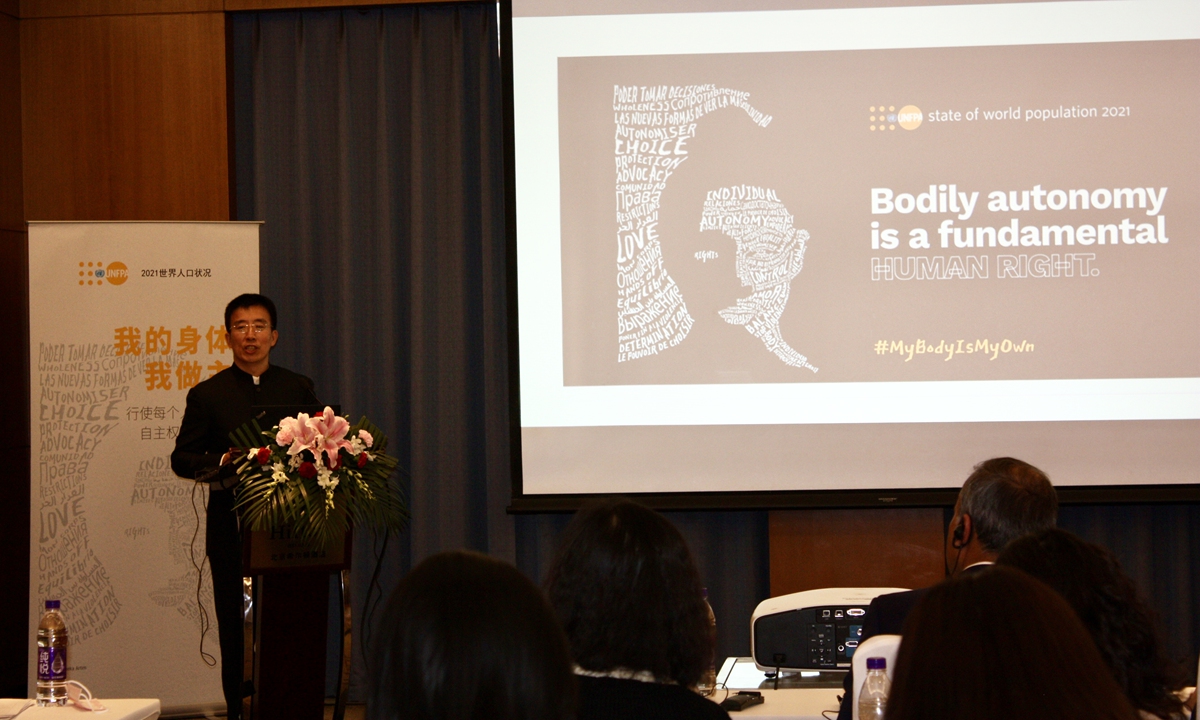Reproductive healthcare policy implementation needed: experts
With necessary policies in place, China needs to raise awareness among women to help them make their own decisions in the field of body autonomy, experts said in a report released in Beijing on Friday.
The UN Population Fund (UNFPA) China, the UN sexual and reproductive health agency's office in China, hosted a press release for highlights in Chinese of the report titled My Body is My Own. In the panel discussion among scholars, officials, and volunteers, the session finds it important to raise awareness among students and the younger generations to help them make informed choices in sexuality, reproductive health, and rights.

Liu recommended that those who work in the healthcare sector need to transform their concepts when they provide services; people need to have their own privacy when they consult doctors while exploring contraceptive choices.
"If people are not aware of choices they may have, they can hardly make informed decisions, thus healthcare providers need to be more client-centered," she said.

With UNFPA's support in China, some youth health survey data collection has been carried out since late 2019 although the COVID-19 pandemic has delayed some work, Suren said. So far, 80 percent of data collection among young people aged between 13 and 24 is completed, Suren said.
Data on healthcare services including HIV prevention, contraception, etc., will help the government to develop plans to meet the needs of young people, she added.
Despite constitutional guarantees of gender equality in many countries, worldwide, on average, women enjoy just 75 percent of the legal rights that men do, said Suren.
Women and girls in many instances lack the power to contest these disparities because of low levels of participation in political and other forms of decision-making. Economic marginalization can detract from a woman's financial wellbeing, the report said.

He also revealed that the under-five mortality rate dropped to 7.5 per thousand in 2020, and the maternal mortality rate dropped to 16.9 per 100,000.
In the 14th Five-Year Plan period (2021-25), China will roll out the Healthy China Initiatives in an all-around way as a national strategy to actively respond to an aging population, Yang said.
China will step up more efforts to optimize its birth policy while enhancing the inclusiveness of the fertility policy, he noted.
Like many other countries and regions, China is facing some common questions in population, reproductive health services, gender equality, and women's development, the government would like to cooperate with UNFPA China through academic exchanges, seminars to initiate problem-solving, and share China's experience, Yang said.
Since UNFPA began providing assistance in China in 1979, it has contributed substantially to strengthened capacity to conduct demographic analyses and use data for policy planning.
As time goes on, UNFPA China shifted its attention to a comprehensive approach to sexual and reproductive health, including quality of care and advocacy for informed choice, Suren said.
Suren said that sexual education is very important and UNFPA is working with its partners to include such contents into curriculums for schools and some programs are expected to roll out in July.
The UN Population Fund (UNFPA) China, the UN sexual and reproductive health agency's office in China, hosted a press release for highlights in Chinese of the report titled My Body is My Own. In the panel discussion among scholars, officials, and volunteers, the session finds it important to raise awareness among students and the younger generations to help them make informed choices in sexuality, reproductive health, and rights.

Liu Hongyan, deputy director-general of China Population and Development Research Center, (second from left) at panel discussion during the launch event on Friday in Beijing Photos: Dong Feng/GT
Liu Hongyan, deputy director-general of China Population and Development Research Center, told the Global Times that China needs to make more efforts to get the last mile of reproductive policies implemented at grassroots levels so that people have sufficient options and are comfortable with what they decide for their own bodies and families.Liu recommended that those who work in the healthcare sector need to transform their concepts when they provide services; people need to have their own privacy when they consult doctors while exploring contraceptive choices.
"If people are not aware of choices they may have, they can hardly make informed decisions, thus healthcare providers need to be more client-centered," she said.

Navchaa Suren, UNFPA China Representative a.i., presents overview of the report on Friday in Beijing.
In the global report, though, some major data related to China is not available. Navchaa Suren, UNFPA China Representative a.i., told the Global Times that UNFPA China is working with partners in government to clarify what specific data is needed so that in the next report, more data might be available.With UNFPA's support in China, some youth health survey data collection has been carried out since late 2019 although the COVID-19 pandemic has delayed some work, Suren said. So far, 80 percent of data collection among young people aged between 13 and 24 is completed, Suren said.
Data on healthcare services including HIV prevention, contraception, etc., will help the government to develop plans to meet the needs of young people, she added.
Despite constitutional guarantees of gender equality in many countries, worldwide, on average, women enjoy just 75 percent of the legal rights that men do, said Suren.
Women and girls in many instances lack the power to contest these disparities because of low levels of participation in political and other forms of decision-making. Economic marginalization can detract from a woman's financial wellbeing, the report said.

Yang Wenzhuang, director-general in Department of Population Monitoring and Family Development with the National Health Commission of China, addresses at the launch event of 2021 State of World Population global report in Beijing on Friday.
China's infant mortality rate dropped to 5.4 per thousand in 2020, said Yang Wenzhuang, director-general in the Department of Population Monitoring and Family Development with the National Health Commission of China, during his address.He also revealed that the under-five mortality rate dropped to 7.5 per thousand in 2020, and the maternal mortality rate dropped to 16.9 per 100,000.
In the 14th Five-Year Plan period (2021-25), China will roll out the Healthy China Initiatives in an all-around way as a national strategy to actively respond to an aging population, Yang said.
China will step up more efforts to optimize its birth policy while enhancing the inclusiveness of the fertility policy, he noted.
Like many other countries and regions, China is facing some common questions in population, reproductive health services, gender equality, and women's development, the government would like to cooperate with UNFPA China through academic exchanges, seminars to initiate problem-solving, and share China's experience, Yang said.
Since UNFPA began providing assistance in China in 1979, it has contributed substantially to strengthened capacity to conduct demographic analyses and use data for policy planning.
As time goes on, UNFPA China shifted its attention to a comprehensive approach to sexual and reproductive health, including quality of care and advocacy for informed choice, Suren said.
Suren said that sexual education is very important and UNFPA is working with its partners to include such contents into curriculums for schools and some programs are expected to roll out in July.
